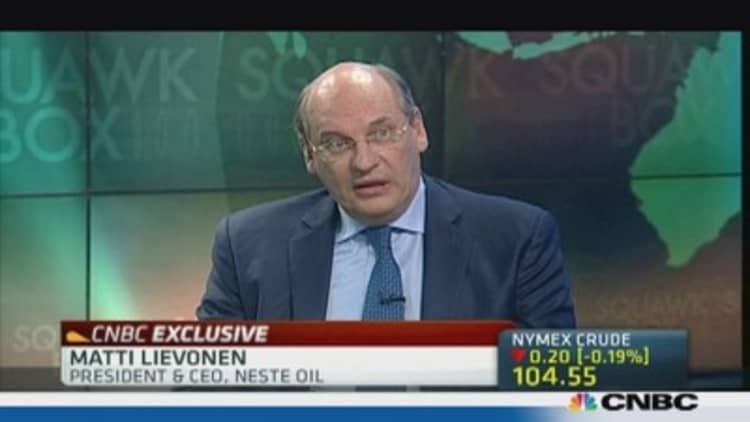Benchmark oil prices will likely extend their declines this week as Iran's leadership adopts a more moderate stance towards the West, raising speculation of a speedier end to international sanctions which have cut the OPEC nation's crude exports by more than a half since early 2012.
Scheduled U.S. data releases this week will undoubtedly create near-term volatility in oil markets as investors again try to second-guess when the Federal Reserve will start cutting asset purchases. The central bank last week unexpectedly maintained quantitative easing, generating a broad-based 'risk-on' move in equities, bonds and commodities.
(Read more: Oil markets price in 'taper lite' as Syria risk fades)
However, diplomatic efforts aimed at ensuring a handover of Syria's chemical weapons and capitalizing on the beginning of a thaw in U.S.-Iran relations may take center-stage for the global oil markets. Any signs of progress in cooling the political temperatures in the Middle East may help set the tone for lower prices.
Both gold and oil "will be sensitive" to the general United Nations assembly meeting this week, said David Greenberg, President, Greenberg Capital in New York. "If the U.N. does not take on the challenge and put Syria to a vote, another line in the sand will be crossed and the United States' hand will be forced to take action or risk losing whatever perceived power they might have left."

President Barack Obama has told Iran's President Hassan Rouhani in an exchange of letters that the United States is ready to resolve its nuclear dispute with Iran in a way that allows Tehran to show it is not trying to build weapons, the White House said on September 18, Reuters reported.
More than half of the respondents in CNBC's latest poll of oil market sentiment (about 56 percent, or 15 out of 27) believe prices will fall this week. However, a minority of less than a fifth (or 5 out of 27) are not ruling out gains if the current round of diplomatic pressure on Syria fails, setting the stage once more for military action.
(Read more: Phew! Futures indicate that the oil spike won't last)
Brent crude oil ended down 3 percent last week as Libyan output improved and signs of diplomatic progress in Syria as well as Iran's ongoing standoff with the West helped drain some of the geopolitical risk from the market, Reuters reported.
"Oil sentiment is clearly deteriorating as the focus switches away from Syria, Libya etc. towards high OPEC deliveries and increasing U.S. production," said Eugen Weinberg, Head of Commodity Research at Commerzbank. "The Rouhani letter is worsening the outlook (for oil) further making a loosening of sanctions possible," Weinberg noted, referring to the exchange of letters between Washington and Tehran.
Expectations are high heading into the second week of the United Nations General Assembly in New York of a meeting between U.S. President Barack Obama and Iran's Hassan Rouhani on the sidelines of the event – the first direct bilateral talks between the two leaders since the 1979 revolution.
Michael Hudson, Director of the Middle East Institute at the National University of Singapore gave an Obama-Rouhani meeting a "40-60 chance" of happening on the sidelines of the U.N. General Assembly, saying a meeting would be nothing short of historic, upending "the whole Middle East situation."
(Read more: Syria conflict and the oil market: Worst and best scenarios)
Equally important, members of the U.N. Security Council – composed of Russian, U.S., British, French and Chinese diplomats – will meet next week to discuss a draft resolution on removing Syria's chemical stockpile.
U.S. Secretary of State John Kerry said on Sept. 19 it was essential that a Russia-U.S. deal on eradicating Syria's chemical weapons arsenal be enforced and that the U.N. Security Council must act on it next week, Reuters reported.
"It is vital for the international community to stand up and speak out in the strongest possible terms about the importance of enforceable action to rid the world of Syria's chemical weapons," Kerry told reporters.
—By CNBC's Sri Jegarajah, folow him on Twitter @cnbcSri



